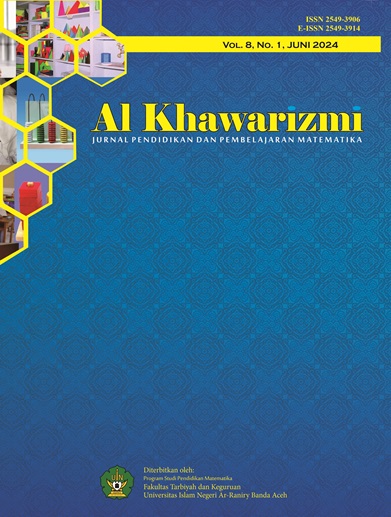Students' Mental Behavior in Solving Mathematical Problems Based on Mathematical Ability and High Cognitive Style
DOI:
https://doi.org/10.22373/jppm.v8i2.26716Keywords:
Perilaku Mental, Field Independent, Field Dependent, Pemecahan Masalah MatematisAbstract
Mental behavior is the activities that occur in a person's mind when solving mathematical problems. These activities are important to explore in problem solving, but exploration of activities is still rarely done by lecturers. This study aims to describe mental activities in solving mathematical problems of students who have high mathematical abilities and field independent (FI) and field dependent (FD) cognitive styles. This study uses a descriptive qualitative method with the subjects of the study being mathematics education students at Syiah Kuala University in the 2023 academic year. Data collection techniques were carried out using problem-solving tests and interviews. Data analysis was carried out by data reduction, presentation, and drawing conclusions. Data validity was carried out by time triangulation. The results of the analysis obtained mental activities in problem solving displayed by students with high mathematical abilities and FI cognitive styles were more complete than students with FD cognitive styles in the activities of reading questions, understanding questions, linking information and explaining solutions, but the mental activities displayed by FI were the same as FD at the calculation and manipulation stages. Therefore, it is necessary to provide experience to FD students toReferences
Abidin, Z., & Jarmita, N. (2020). Studentsâ€TM Intuition of Field Independent and Field Dependent in Solving Divergence Mathematical Problem. Kreano, Jurnal Matematika Kreatif-Inovatif, 11(2), 223–235. https://doi.org/10.15294/kreano.v11i2.26804
Adawiyah, R., Meiliasari, & Abdul Aziz, T. (2022). (JIML) JOURNAL OF INNOVATIVE MATHEMATICS LEARNING THE ROLE OF PRIOR MATHEMATICAL KNOWLEDGE AND INTEREST IN MATHEMATICS ON MATHEMATICAL CONCEPT UNDERSTANDING ABILITY IN SENIOR HIGH SCHOOL STUDENTS. https://doi.org/10.22460/jiml.v5i4.p196-204
Ahmad, A., Saad, N. S., & Ghani, S. A. (2014). MATHEMATICAL PROBLEM-SOLVING BEHAVIOR OF SUCCESSFUL PROBLEM SOLVERS. JURNAL PENDIDIKAN SAINS & MATEMATIK MALAYSIA, 4(2).
Aisyah, A. S., & Novitasari, P. (2023). THE STUDENTS’ MATHEMATIC PROBLEM SOLVING PROFILE REVIEWED ON GENDER DIFFERENCES Artikel info (Vol. 7, Issue 2). https://jurnal.ar-raniry.ac.id/index.php/alkhawarizmi
Alifiani, & El Walida, S. (2020). PROSES METAKOGNITIF MAHASISWA DALAM MENGERJAKAN SOAL HIGHER ORDER THINKING SKILLS DITINJAU DARI GAYA KOGNITIF. Jurnal Pendidikan Matematika, 4(2), 84–99.
Angeli, C. (2013). Examining the effects of field dependence-independence on learners’ problem-solving performance and interaction with a computer modeling tool: Implications for the design of joint cognitive systems. Computers and Education, 62, 221–230. https://doi.org/10.1016/j.compedu.2012.11.002
Anisah, & Lastuti, S. (2018). Pengembangan Bahan Ajar berbasis HOTS untuk Meningkatkan Kemampuan Pemecahan Masalah Matematis Mahasiswa. KREANO: Jurnal Matematika Kreatif Inovatif, 9(2), 191–197.
Bambang, S. R. M., Salasi, R., Hasbi, M., & Mardhiah, M. Z. (2018). The development of an instrument to explore non-routine problem solving strategies among mathematics education students. Journal of Physics: Conference Series, 1088. https://doi.org/10.1088/1742-6596/1088/1/012059
Das, R., & Chandra Das, G. (2013). Math Anxiety: The Poor Problem Solving Factor in School Mathematics. International Journal of Scientific and Research Publications, 3(4). www.ijsrp.org
Lambdin, D. V. (2009). Benefits of Teaching through Problem Solving. www.nctm.org.
Leiba, M. (2013). Assessing Mathematical Problem Solving Behavior in Web-Based Environments Using Data Mining.
Lester, F. K. (2013). Thoughts about research on mathematical problem- solving instruction. Mathematics Enthusiast, 10(1–2), 245–278. https://doi.org/10.54870/1551-3440.1267
Miles, M., & Huberman, A. (2012). Qualitative Data Analysis (2nd ed.). Sage Publication.
Nurafni. (2016). GAYA KOGNITIF FIELD DEPENDENT TERHADAP PEMAHAMAN KONSEP LIMIT MAHASISWA PENDIDIKAN MATEMATIKA. KLMTK: Jurnal Pendidikan Matematika, 1(2), 183–194.
Nurmutia, H. E. (2019). Pengaruh Gaya Kognitif Terhadap Kemampuan Pemecahan Masalah Matematis Siswa. EDUMATIKA: Jurnal Riset Pendidikan Matematika, 2(2). https://doi.org/10.32939/ejrpm.v2i1.443
Pape, S. J. ;, & Tchoshanov, M. A. (2001). The Role of Representation(s) in Developing Mathematical Understanding. In Spring (Vol. 40, Issue 2). www.manaraa.com
Puji Astutik, E., Maya Purwasih, S., Buana Surabaya Jalan Dukuh Menanggal XII, A., Gayungan, K., Surabaya, K., & Timur, J. (2023). Mosharafa: Jurnal Pendidikan Matematika Field Dependent Student Errors in Solving Linear Algebra Problems Based on Newman’s Procedure. 12(1). http://journal.institutpendidikan.ac.id/index.php/mosharafa
Soesanto, R. H., & Dirgantoro, K. P. S. (2021). Kemampuan Pemecahan Masalah Mahasiswa pada Kalkulus Integral Dilihat dari Keyakinan dan Pengetahuan Awal Matematis. Jurnal Elemen, 7(1), 117–129. https://doi.org/10.29408/jel.v7i1.2899
Tambychik, T., & Meerah, T. S. M. (2010). Students’ difficulties in mathematics problem-solving: What do they say? Procedia - Social and Behavioral Sciences, 8, 142–151. https://doi.org/10.1016/j.sbspro.2010.12.020
Wakit, A., & Hidayati, N. (2020). Kemampuan Pemecahan Masalah Matematika Mahasiswa Teknik Sipil Ditinjau dari Gaya Kognitif. Kreano, Jurnal Matematika Kreatif-Inovatif, 11(1), 101–109. https://doi.org/10.15294/kreano.v11i1.21047
Yuniara, R., Abidin, Z., & Johar, R. (2023). STUDENTS’MATHEMATICAL PROBLEM SOLVING ABILITY BASED ON THE STEPS OF IDEAL PROBLEM SOLVING VIEWED FROM ADVERSITY QUOTIENT (AQ). https://jurnal.ar-raniry.ac.id/index.php/alkhawarizmi

